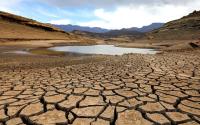13 September 2005Accuracy in MediaRoger Aronoff
The global warming controversy has just entered a new venue, as a federal judge in San Francisco (where else?) ruled that a lawsuit challenging two federal agencies, the Export-Import Bank and the Overseas Private Investment Corporation (OPIC) could move forward. Judge Jeffrey White ruled that the radical environmental groups, Friends of the Earth and Greenpeace, along with the cities of Boulder, Colorado, Santa Monica, Oakland and Arcata, California, have standing to proceed with this suit, which was originally filed in 2002. The environmentalists may cite media figures, such as Miles O'Brien of CNN, as witnesses for their claims.
OPIC and the Ex-Im Bank provide loans and insurance coverage to billions of dollars of U.S. backed projects around the world. Among the projects are oil fields in Russia, Southeast Asia, West Africa, Mexico and the Caspian Sea area. The suit charges that while approving more than $32 billion in loan guarantees and insurance over the past decade, OPIC and Ex-Im have ignored Environmental Protection Act (EPA) mandates and the National Environmental Policy Act. The suit argues that they have continued supporting these fossil-fuel projects without considering the harm they might do to the planet.
According to the Associated Press, however, the judge's ruling was rather narrow. He imposed no burdens on the agencies, but simply said that these groups have the standing to sue. The issue of whether or not U.S. environmental rules and laws would apply to these specific projects will most likely be litigated. If this starts to look promising, stay out of the way of personal injury trial lawyers. This will make the dubious asbestos cases seem small time.
There has been a media frenzy over the last several months suggesting that the debate is over as to whether or not global warming exists, and whether or not man is a significant contributor to the phenomenon. CNN presented a documentary last March, repeated several times since, called "Melting Point." Host Miles O'Brien says near the beginning, "But now the scientific debate is largely over. There is overwhelming consensus that the threat is real, that humans are at least part of the cause, and that something must be done." He did include two skeptics, Dr. Patrick Michaels of the Cato Institute and Dr. Richard Lindzen of MIT. But they were two of approximately 20 people interviewed and their most powerful arguments against the theory were left out. Lindzen points out that we have enough trouble predicting the weather two days in advance. How can we have any confidence in predicting 40 years ahead?
Michaels explains that if global warming is not presented as a crisis-in-waiting, how can these scientists who create computer models charting disaster get a share of the $4 billion being spent this year on research. Then O'Brien closes with this: "Michael's position is in the minority. The consensus is the scientific debate is all but over."
The CNN view is widely accepted by the media. USA Today had a front-page story in June headlined, "The Debate's Over: Globe is Warming." Nightline had an episode earlier this year in which Ted Koppel began by saying that they weren't going to debate whether or not global warming is a real phenomenon, and proceeded to attribute the pending extinction of certain frogs to climate change.
The fact is that not everyone agrees. While many of the skeptics believe there has been some slight warming, some of it possibly attributable to man's use of greenhouse gases, it could also be a natural variation in the earth's atmosphere. Many questions persist. How much is from solar activity? And if the warming is only going to be one degree hotter in a century from now, couldn't that actually be better for the world in terms of food production and plant life?
James Schlesinger, former energy secretary, wrote an article in the Wall Street Journal in August, entitled,"The Theology of Global Warming." He points out that "most of the global warming in the 20th century occurred between 1900 and 1940, when the release of greenhouse gasses was far less than later in the century. Between 1940 and 1975, temperatures fell—and scientists feared a lengthy period of global cooling…We must always bear in mind that the earth's atmosphere remains a highly complex thermodynamic machine. Given its complexities, we need to be modest in asserting what we know. Knowledge is more than speculation."
As to whether or not there is a consensus among scientists, consider this: Fred Singer, an atmospheric physicist, professor emeritus of environmental sciences at the University of Virginia, and former director of the U.S. Weather Satellite Service, notes that "Thousands of scientists from many countries now fully understand that Kyoto and other efforts to control human emissions of carbon dioxide (CO2) are ineffective and entirely unfounded scientifically."
He and Schlesinger both point to the Oregon Petition [http://www.oism.org/pproject/], in which between 17,000 and 18,000 signatories, nearly all of whom are scientists, mostly with advanced degrees, declared that "There is no convincing evidence that human release of carbon dioxide, methane or other greenhouse gasses is causing or will, in the foreseeable future, cause catastrophic heating of the Earth's atmosphere and disruption of the Earth's climate." Even the United Nations' Intergovernmental Panel on Climate Change (IPCC) is far from conclusive. In June of this year, IPCC vice president Yury Izrael wrote that "There is no proven link between human activity and global warming."
The playing field for the global warming issue used to be the Kyoto Treaty, which former President Clinton signed and advocated. But when its provisions were put up for a vote in the U.S. Senate, 95 members voted no, primarily because the treaty would wreck the U.S. economy.
One might think that the Friends-of-the-Earth/Greenpeace lawsuit could finally settle this debate once and for all. But don't count on it. The idea of testing evidence before some impartial jury is appealing but not very realistic. If the courts are as biased as our media, don't look for the truth to emerge.
![]()
Roger Aronoff is a Media Analyst at Accuracy in Media and the writer/producer of the documentary "Confronting Iraq." He can be reached at [email protected].






